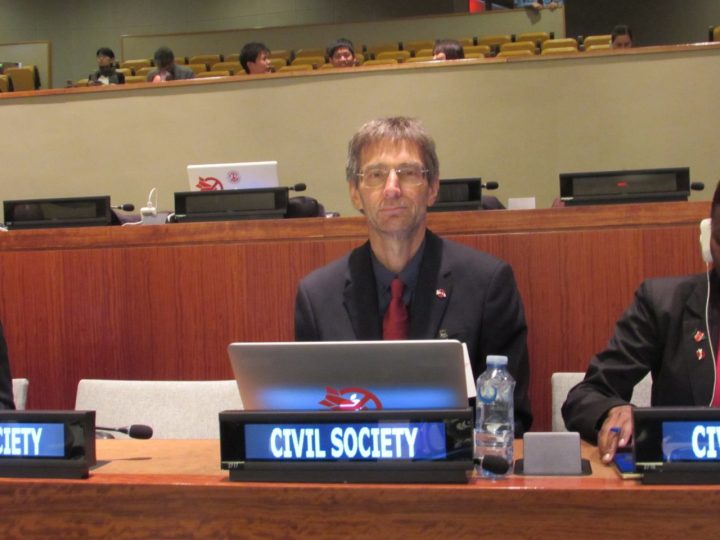The first negotiating session of the historic conference to negotiate a treaty to ban and provide for the elimination of nuclear weapons has just finished. In content, process and significance, it was extraordinary. The number of states participating was 132—even more than the 123 that voted for the UN resolution mandating these negotiations.
The real news of this conference was not the unconscionable boycott of the first UN negotiations for nuclear disarmament in more than 20 years, by a group of states who claim a special right to threaten the whole of humanity with radioactive incineration. The most important news was that two-thirds of all the world’s governments, international organisations including the Red Cross, and many civil society organisations were in the room getting on with negotiating a treaty to rid the world of the most terrible of all weapons. A treaty that will change the world.
The rules of procedure, so often contentious and causing delays in getting on with substantive business at UN meetings, were agreed within minutes. The absence or silence of those who oppose a treaty banning nuclear weapons was helpful. The value of the three international conferences on the humanitarian impacts of nuclear weapons was evident—the vast majority of states made reference to the catastrophic humanitarian consequences of any use of nuclear weapons, the impossibility of any meaningful response, and the real and growing danger of nuclear war as long as the weapons exist; compelling their urgent elimination and driving the need to ban them. Many were well aware of IPPNW’s work on nuclear famine: that the starvation of billions of people is risked by a regional nuclear war using but a tiny fraction of the global nuclear arsenal.
We can be pleased that our efforts over decades to promote correct, evidence-based understanding of the essential facts about the consequences of nuclear war have contributed to so many governments grasping these realities and their implications, and now acting on them.
There was broad agreement on much of what should be in the new treaty, identification of some aspects on which views are more varied, and substantial discussion of how these differences might be narrowed. Rather than simply a succession of prepared statements, there was real discussion, with governments willing to identify questions and areas on which their views were not yet fully formulated, and open to evidence and argument.
The positive constructive atmosphere continued on day five, the last day of the March session of the conference, which focused on institutional arrangements. This might sound rather dry compared with the purpose and operative provisions of the treaty, but covers issues key to the implementation and effectiveness of the treaty. Helena Nolan from Ireland noted that no one watching these proceedings could any longer question the seriousness of the collective intent in the room. There was unanimous support for the continuing importance of the NPT.
There was broad agreement on a number of issues, including:
- that the treaty should enter into force when ratified by a specified number of countries, with no particular country or group of groups being required to be on board;
- that the treaty should be of indefinite duration, but able to be amended;
- that countries should only be able to join the treaty if they accepted all of its provisions, without reservations;
- that regular meetings of states parties should occur;
- that the treaty should have an organization to act as secretariat and assist its implementation.
Many governments and diplomats were skeptical that a nuclear disarmament treaty could be negotiated through the UN, in New York, and without the participation of nuclear-armed states. They were wrong. The conference moved well beyond adopting rules of procedure and gathering the views of states; already, serious negotiating work is underway and off to a better start than most of us dared to expect.
The meeting closed with the president, Ambassador Elayne Whyte from Costa Rica, emphasising, both in Spanish and in English, in case anyone missed it, her determination to fulfill the mandate given by the UN General Assembly and the urgency it embodies by completing and adopting a text for the new ban treaty by the scheduled end of the conference on 7 July – just 14 weeks away.
Tilman Ruff is co-president of IPPNW.










